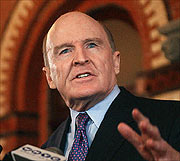
New York
Yesterday, I was reminded how incredibly interesting it is to live in Gotham.
I lunched at The Carlyle Hotel, an upper east side institution, home of the rich and famous ( Elaine Stritch has lived there for years and I've seen author Tom Wolfe tucked away in one of the many banquettes along the perimeter of the elegant dining room. Kathy, a friend from Philadelphia, had invited me to lunch--and let me pick the place. The seafood salad is so good. The waiter asked if we wanted to share one portion. My reply: absolutely not! The dinner-sized plate, piled with pink shrimp, red lobster claws and pearly white crab, arrived--one for each of us.
Now on to the evening venue--an interview by the editor of BusinessWeek with Jack Welch, former CEO of GE, and a legend in the world of business.
Another friend, Yvonne, my friend from Dublin, had invited me to join her for the talk, part of an excellent series on major figures from all walks of life at the 92nd Street Y, another Manhattan institution.
Although I had my own bias about Welch or "Neutron Jack" as he is known for his ballistic style of management, I wanted to hear and see him for myself. With Welch on stage was his wife ( #3 ) Suzy nee Wetlaufer, former editor in chief of the Harvard Business Review. As it turns out, they were hawking their new book and promoting their joint column in "O" magazine.
Physically, Welch, now 71, is smaller than I expected, probably 5'7" or so. Suzy, 24 years younger, is tall and lanky, and looks younger than her 47 years. The interviewer, well prepared, asked him questions ranging from the effect of global warming concerns on business to his now famous management theory including the 10-70-20 rule. Welch believes that the job of management is to get rid of the bottom 10% of the workforce who are performing poorly on an annual basis. Conversely, he believes tha the top 20% should be rewarded handsomely. ( You may remember that his severence or, I think he called it his "succession" package was so lucrative that the Fed got involved to see if there were any irregularities.
I have a friend, Harvard Business School PhD, who interviewed Mr. Welch as part of his doctoral dissertation in the late 70s before Welch was CEO of GE. I remember Paul talking about watching Welch run a meeting, and at one point, getting on the table ( shoes and all ) to make a point to his top management. Under Welch's watch, GE became a massively wealthy company, the darling of Wall Street because of its reliable earnings and meteoric rise.
But what about Jack Welch the man? His partner on stage, Suzy Welch, met Jack when she did an interview for HBR on him in 2000 or so. Apparently, there was some chemistry because they began a quite public affair. His wife at the time of 13 years, Jane ( nee Beasley ) had married him in 1988 with a prenup--which expired 3 years before the affair, and eventual breakup.The second Mrs. Welch, a lawyer, decided to go after Mr. Welch's assets--half of them--in 2002 which was finally settled out of court. But there was talk that she received up to $360 million. Does this sound like gossip? I suppose. But, I'm trying to figure out how someone with the obvious intellect of Jack Welch determines when he's ready to move on. Wife # 1, Carolyn was married to him for 28 years, 4 kids -- you know the rest. Jane, 17 years younger than Jack was #2. Then Suzy, 24 years younger was #3.
On stage, the interviewer would field some of the questions to this obviously bright woman. When asked if there was a glass ceiling--or if she thought women made better managers than men--she deferred, offering probably not. When asked about biology and the board room, she noted that she had four kids from a previous marriage, and that that effected up to a decade of her work life and career goals. I wonder if Suzy thinks that childcare should just stay open longer -- or if women who are ambitious and want to rise to the top should just not have a family-- a notion that earlier generations of women ( Katherine Hepburn for one ) subscribed to. ) I thought it was a bit of a narrow viewpoint. Come on, Suzy, its the 21st century--could business adapt for the common good..just a little bit?
After the interview, both Welches signed their new book. I went downstairs with Yvonne to a reception but eventually realized that they were not going to join the guests there--they were going to leave after the books were signed. And I'd decided I'd like to meet Jack Welch.
When I got back upstairs, they were signing the last book, and some Y folks were chatting pleasantries with them. I moved toward the table, and put out my hand. " Hello, Mr. Welch, my name is Mary Catherine Bolster. I think you know my brother."
He rose from the table, shook my hand, and we talked for a few minutes. "Suzy, meet Mary Catherine," he said. This was a very charming man, I thought to myself. We talked for a bit longer, I introduced him to Yvonne, he gave me a hug,and then I excused myself.
Hard not to like this man regardless of the stories, the wives, his rock star status among usually staid CEOs. Shows you that people are just more complicated than their People magazine persona.
And, as I was walking home, I thought to myself--I may never shake hands with someone who is worth probably $8-900 Million dollars.
It's a great city I live in, where events just like the one I attended are going on, music is being made, plays are being staged. Just great.
M.C.
No comments:
Post a Comment